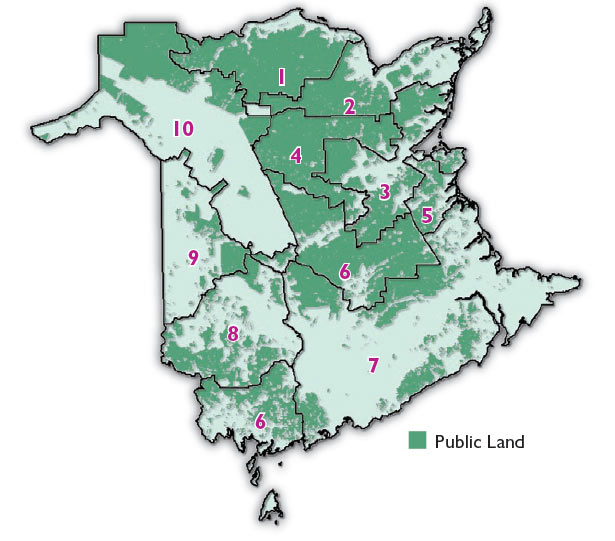Economic Development Ideas for NB
For this week's post, I wanted to share some ideas about economic development in New Brunswick. Most of them are things I've discussed on Facebook before, and I doubt any of these ideas are original—I just think they're worth promoting.
Four Ideas
Immigration
For a variety of reasons, there is a lot of emigration from France (even more so when it comes to French Jews) these days (see here, here, here and here, for examples). I think NB should try to get in on this trend. As in, run ads in France to snag some immigrants, by promoting our lower taxes, lower crime, lower crowding, and less red tape for starting a business (relative to France).
Crown Land Development
A lot of space in New Brunswick is taken up by Crown Land. That's great for conservation, but it also makes the province feel even more sparsely populated than it is. In my opinion granting leases for non-forestry development on a small portion of this land would provide some infill (and revenue for the provincial government). It wouldn't have to be large blocks; I envision development corridors along 100-series and lower highways, for example. This idea would involve perhaps adding more eligible development categories for leases and pursuing/marketing to potential lessees more intentionally.

Friendly Regulatory Environment
A lot of cool innovations seem to run into regulatory hurdles or hassles just as they start to build momentum. Recent examples include: Uber, Airbnb, Bitcoin, and civilian drone use. I wouldn't be surprised to see 3d printing encounter such hurdles before too long. This leads to an idea that could boost NB's economy: being a jurisdiction that offers a lot of leeway to these (and other) innovations. For one example, we could designate some airspace as unrestricted for UAVs. I don't mean to necessarily leave emerging technologies unregulated—although that is probably the correct approach in some cases—but to keep regulations current with changing technologies and business models so that it's clear that you can start a business in NB in one of these (and other) fields with no worry that you'll face fines or get shut down.
Focus on our Strengths
Budgets are tight for post-secondary education these days. In spite of this, I feel it is important to continue to invest in research and programs that can set us apart. At UNB, there are a number of departments or research institutes that I would count as strengths for the province that should be promoted:
- Forestry
- Geodesy and Geomatics Engineering
- Nuclear
- Entrepreneurship (esp. in technology fields)
- Canadian Rivers Institute
General Comments
These ideas are just my non-expert musings and observations. For someone who's done a lot more study on these issues, check out David Campbell's blog (which I've linked to before).
The provincial budget is expected to be released in late March or early April, I believe. When that happens, I plan to write a post highlighting some of the key facts and figures.
Now for the really controversial part of this post (which may be more relevant once the price of oil rebounds):
With all of the pipeline debates going on these days, I wanted to share a few points (all my opinion) that I feel should be part of the discussion:
-
Physical infrastructure can be adapted as needs change. A pipeline built to carry natural gas or dil-bit today could potentially be modified (or at the very least, the right-of-way reused) in the future to carry biodiesel or bio-CNG. In New Brunswick, I believe poor rail access has disadvantaged industry here for at least as long as I've been alive. I anticipate pipelines to be as important an infrastructure in the 21st century as railroads were in the 20th.
-
The social and institutional capital that builds up around these kinds of projects is another factor to consider. There's a lot of overlap between the skills needed for handling and processing fossil fuels and those required to implement renewable energy on an impactful scale. Trades and professions from welders to control engineers, and even roles on the financial side of things, like hedging energy prices—all are valuable to have around. Processing and transshipment locations for oil & gas will, in my judgment, be well positioned to transition to biofuels when that industry starts to really take off.
-
I worry that having the assessment/approval/appeals process on these projects tie up the better part of a decade sets a bad precedent for all sorts of infrastructure investment. A similar dynamic can be seen in Toronto's long, long wait for significant upgrades/expansion to public transit: once the time spent on studies exceeds the length of the political cycle, there's a risk of getting sent back to the drawing board (over and over). A political/regulatory milieu where it's an exercise in frustration to build anything larger in scope than a condo tower is not conducive to bringing about positive solutions to environmental challenges.
A couple of final points:
-
Concerning biofuels, check out this map to put any ideas of New Brunswick leap-frogging into the "Green economy". Most of the projects have been in areas with a lot of agribusiness or along existing dense industrial corridors.
-
Concerning natural gas, I think T. Boone Pickens has some really good points to make on its potential as a "bridge fuel".